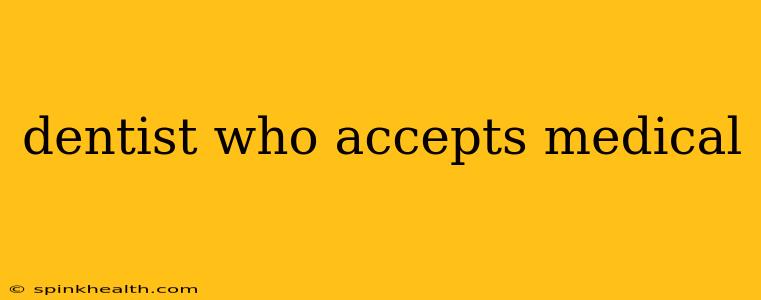Finding a Dentist Who Accepts Medical Insurance: A Patient's Journey
Let's face it: dental work can be expensive. The fear of hefty bills often keeps people from seeking necessary care, leading to more significant problems down the road. But what if you have medical insurance? Can it cover dental procedures? The answer, unfortunately, isn't a simple yes or no. This is where the search for a "dentist who accepts medical insurance" begins – a journey that can feel surprisingly complex. My own experience led me on a quest, and I'm here to share what I learned, hoping to make your search smoother.
My story started with a persistent toothache. Ignoring it wasn’t an option, but the thought of the bill sent shivers down my spine. I had medical insurance, but I’d always assumed dental was a separate beast. Armed with my insurance card and a hefty dose of anxiety, I began calling dentists. The responses were varied, ranging from a confident "Yes, we accept your plan" to a confused silence followed by a referral to their billing department. The experience highlighted the need for a clearer understanding of how medical insurance interacts with dental care.
Does Medical Insurance Cover Dental Work?
This is the million-dollar question, isn't it? The short answer is: sometimes. Most medical insurance plans don't cover routine dental care like cleanings, fillings, or extractions. However, some plans might offer coverage for dental procedures deemed medically necessary. This is where the gray area lies.
What constitutes "medically necessary" dental work? This often hinges on the specific procedure's connection to a broader health issue. For example, if you have a severe infection requiring an extraction to prevent it from spreading, your medical insurance might contribute to the cost. Similarly, if a dental procedure is needed due to an accident or injury, coverage is more likely.
How Can I Find a Dentist Who Accepts My Medical Insurance?
This is where the detective work comes in. Here's a breakdown of strategies that proved effective for me:
-
Contact Your Insurance Provider Directly: This is the most crucial step. Your insurance company possesses the definitive list of dentists in their network who accept their plans. They can provide you with an accurate list of providers and explain their coverage specifics related to dental procedures. Don't hesitate to ask detailed questions about pre-authorizations and what procedures they might cover.
-
Use Your Insurance Company's Online Provider Search Tool: Many insurance providers have a website portal where you can search for in-network dentists. This can be incredibly helpful in narrowing down your options.
-
Check with Your Primary Care Physician (PCP): Your PCP might have recommendations for dentists who frequently work with medical insurance companies for medically necessary procedures. They might also be able to provide letters of medical necessity if needed.
What if My Dentist Doesn't Accept My Medical Insurance?
If your chosen dentist doesn't directly bill your medical insurance, don't despair. You might still be able to submit claims for reimbursement after receiving services. This requires meticulous record-keeping and a deep understanding of your policy's reimbursement guidelines. Contacting your insurance provider to understand this process is crucial.
What Documents Do I Need?
Be prepared to provide your insurance card, identification, and possibly referral letters from your PCP, depending on the nature of the dental work and your insurance policy's requirements.
Finding a dentist who accepts medical insurance, especially for procedures considered medically necessary, is achievable. It requires persistence, thorough research, and clear communication with both your insurance provider and potential dentists. My journey, while initially daunting, led me to the care I needed, and hopefully, my experience will help pave a smoother path for you. Remember, proactive communication is key to navigating the complexities of dental and medical insurance coverage.

